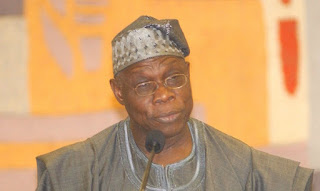OLUSEGUN MATTHEW OKIKIOLA AREMU OBASANJO is the former president of Nigeria from 1999 to 2007. He was a former Nigerian army general who became the military head of state from 13 February 1976 to October 1 1976.
He was a career soldier before he served twice as the head of state under the military government and the president under the democratic government.
He served as a democratically elected president from 1999 to 2007. From July 2004 to January 2006 he served as the chairperson of the African union.
Obasanjo served for two terms in the democracy president.
He spent most of his first term travelling abroad. He succeeded in winning the western support for strengthening Nigeria’s nascent democracy. Britain and united states in particular were glad to have an African ally who was openly critical open of abuses committed in Robert Mugabe,s Zimbabwe at a time when many other African countries were taking a softer stance. Obasanjo also won international praise for roles in regional peacekeeping missions in sierra Leone and Liberia.
The international community was guided in its approached to obasanjo in part by Nigeria’s status as one of the world ten top biggest oil exporters as well as the fear of Nigeria being the largest populous country in the continent.
The national assembly speaker and senate president were involved in conflict with the president leading to him battling with several impeachment moves from both houses. Obasanjo managed to escape impeachment and was re-nominated.
Obasanjo was re-elected as president of Nigeria in 2003 that had violent ethnic and religious overtone.
In November 2003 obasanjo was criticized for his decision to grant asylum to the deposed Liberian president; Charles taylor. On 12th june 2006 he signed the Greentre agreement with Cameroon president PAUL BIYA which formally put an end to the bakassi peninsula border dispute.
Before obasanjo’s administration the Nigeria GDP growth had been very slow since 1987 and only managed 3 percent between 1999/2000. In Obasanjo’s administration the GDP growth doubled increasing to 6 percent till he left office which help in part by high oil prices.
The country’s foreign reserve rose from $2 billion in 1999 to $43 billion on leaving office in 2007.
He was able to secure debt pardon from Paris and London club which amounts to $18 billion paying another $18 billion to be debt free.
Most of these loans were accumulated from short term trade arrears during the exchange control period. In 1982 and 1985 Nigeria operated exchange control regime that vested all foreign exchange transactions on central bank of Nigeria.
The naira exchanged rate to the us dollar and other currency during this period was highly regulated and high. Nigeria stopped accumulating short term foreign trade arrears from 1986.
Subsequent growth of Nigeria’s debt was due to interest on previous years of stock of short term trade debt owed to export credit agencies and non-insured creditors( this information refute the claim that corruption was the corruption was the source of Nigeria’s past foreign debt).

